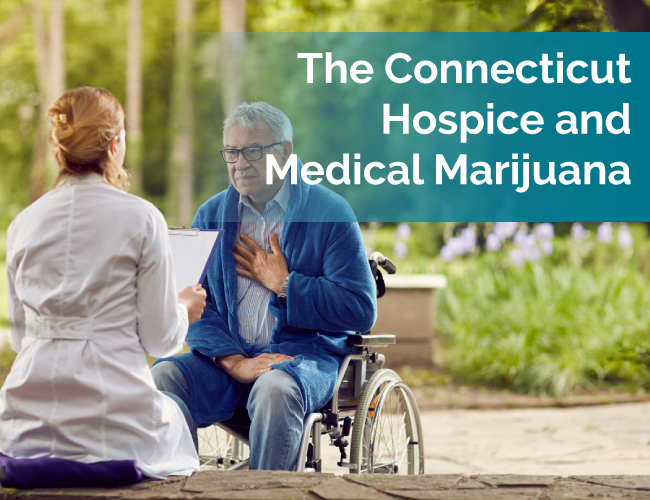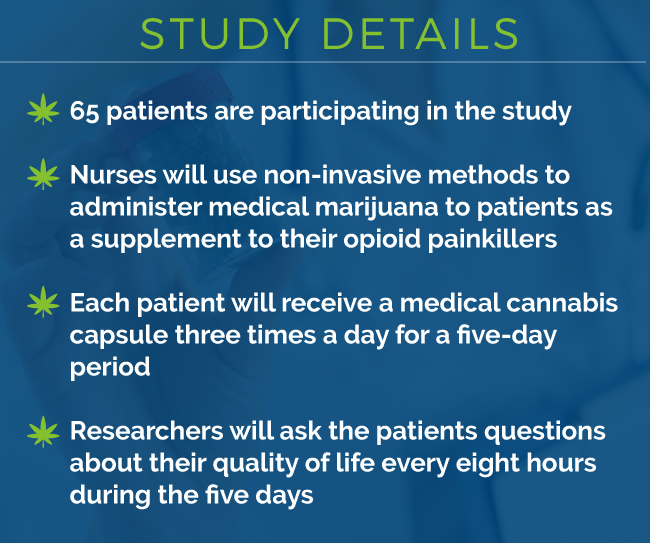Posted by
 Jason Draizin on 09/15/2017 in Medical Marijuana
Jason Draizin on 09/15/2017 in Medical Marijuana

The United States has a severe opioid problem and many of the addictions begin in medical care. When a patient experiences severe pain, a doctor will sometimes prescribe opioids to relieve their symptoms. This can act as a slippery slope — one in three painkiller patients become dependent or addicted.
This addiction can be a devastating one. We desperately need to find an alternate, non-addictive medication for pain relief that patients can use to replace opioids. We’ve compiled considerable resources detailing the painkilling properties of marijuana. However, to gain legitimacy in the medical industry, we need more empirical data on marijuana medicine before it can become a mainstay.
It turns out that places like The Connecticut Hospice want to get that data to change how we view pain relief. As a member of the fight for legal medical marijuana, they want to use evidence and compassion for good.
About The Connecticut Hospice
The Connecticut Hospice knows their stuff. They’ve been in the industry for quite a while, having opened as the first American hospice in 1974. They aim to treat every patient as an entire person instead of just addressing their diagnosis or symptoms. In addition to reducing patients’ symptoms in their final days, they address their social, spiritual and emotional needs.
To meet the goal of tackling every part of a patient’s palliative care, they try to think out of the box to find new methods of care. For instance, they offer therapy animals and strolls in bed down a promenade. One of their newer approaches is medical marijuana treatment.
Medical Cannabis and Opioid in Connecticut
Connecticut legalized medical marijuana in 2012. So, while they don’t have as much experience with legalized medical marijuana as a state like California, they have enough of a foundation to move forward with clinical studies. Researchers are beginning to study cannabis safely and legally.
And just in time. More Connecticut patients become addicted to opioids every day, with prescription painkillers often serving as a “gateway drug.” While 100 people died from heroin addiction in 2012, that number went up to 400 just three years later in 2015.
Progressively, Connecticut is on the way to changing how we view conventional medicine. The Connecticut Hospice is a part of that movement.
How The Connecticut Hospice Study Began
As a hospice employee, you witness the entire process of a patients’ final days — both the good and the bad moments. Wen-Jen Hwu never forgot the experience she had with patients when she was a fellow at The Connecticut Hospice.
So, as chairman of The Connecticut Hospice’s Professional Advisory Committee, she worked together with the organization’s staff to design a study. They aim to research the impact of cannabis treatment on patients at The Connecticut Hospice who volunteer to participate.
After three years of managing paperwork, the team had their research approved in 2016. The study began in May 2017 and is still in progress at the time of writing. Since the study is slated to last six months, it will end in November 2017.
What Questions Does The Connecticut Hospice Study Aim to Answer?
If you’re familiar with research methods and standards, you may know that researchers must specify exactly what they want to find out. For instance, instead of stating that you want to study cannabis and mood, you would need to refine it into something exact like cannabidiol’s effect on depression patients.
This means that The Connecticut Hospice aims to find answers to particular questions they have about the impact of medicinal cannabis use on hospice patients. Some of the questions they ask include:
- Does medical marijuana change the pain scores reported by hospice patients? By how much?
- Can cannabis medicine counteract the food and digestion-related side effects of narcotic painkillers?
- Does it improve reduced appetite due to painkillers?
- Does it relieve nausea and vomiting caused by painkillers?
- Can marijuana medicine reduce depression symptoms and improve the patient’s quality of life?
- How does each component of medical marijuana impact the patient’s treatment?
Overall, The Connecticut Hospice intends to conduct and use their research the same way that they treat their patients — holistically. By looking at their data from a quality of life perspective, they can further their goals of making their patients’ palliative care a happier and healthier experience.
The Nitty-Gritty Details
In addition to specifying the exact ideas behind a study, researchers need to outline precisely how they want to get their information. They must state how many people will be involved, the dosage amounts, the time that someone gets a dose and other such numbers. Knowing these figures helps us understand how we can apply the results to things that happen in everyday life.

The Connecticut Hospice detailed how they’re going to find the answers to their questions. Here are some facts about their methodology:
- 65 patients are participating in the study
- The Connecticut Hospice’s nurses will use non-invasive methods to administer medical marijuana to patients as a supplement to their opioid painkillers
- Each patient will receive a medical cannabis capsule three times a day for a five-day period
- Researchers will ask the patients questions about their quality of life every eight hours during the five days
Our Study on Medical Marijuana
Speaking of research, did you know that we’re conducting a survey of our own that you can take part in? Using our Symptom Tracker tool, you can enter information about the traditional medicine you take, your marijuana medicine and the symptoms you experience.
By recording the ways that marijuana benefits your health, we can help prove that marijuana is a legitimate medicine that should be federally legal. We keep your information private, so there is no need to worry about people knowing your patient status.
Using the power of data, we can change the medical industry as we know it. We hope you can join folks like The Connecticut Hospice and us in promoting alternative medicine.
Opinions expressed the above syndicated article by Jason@MarijuanaDoctors.com(Jason Draizin) are for informational purposes only and not necessarily the opinion of Herban Medical Options.
For full article and information, visit: Source

